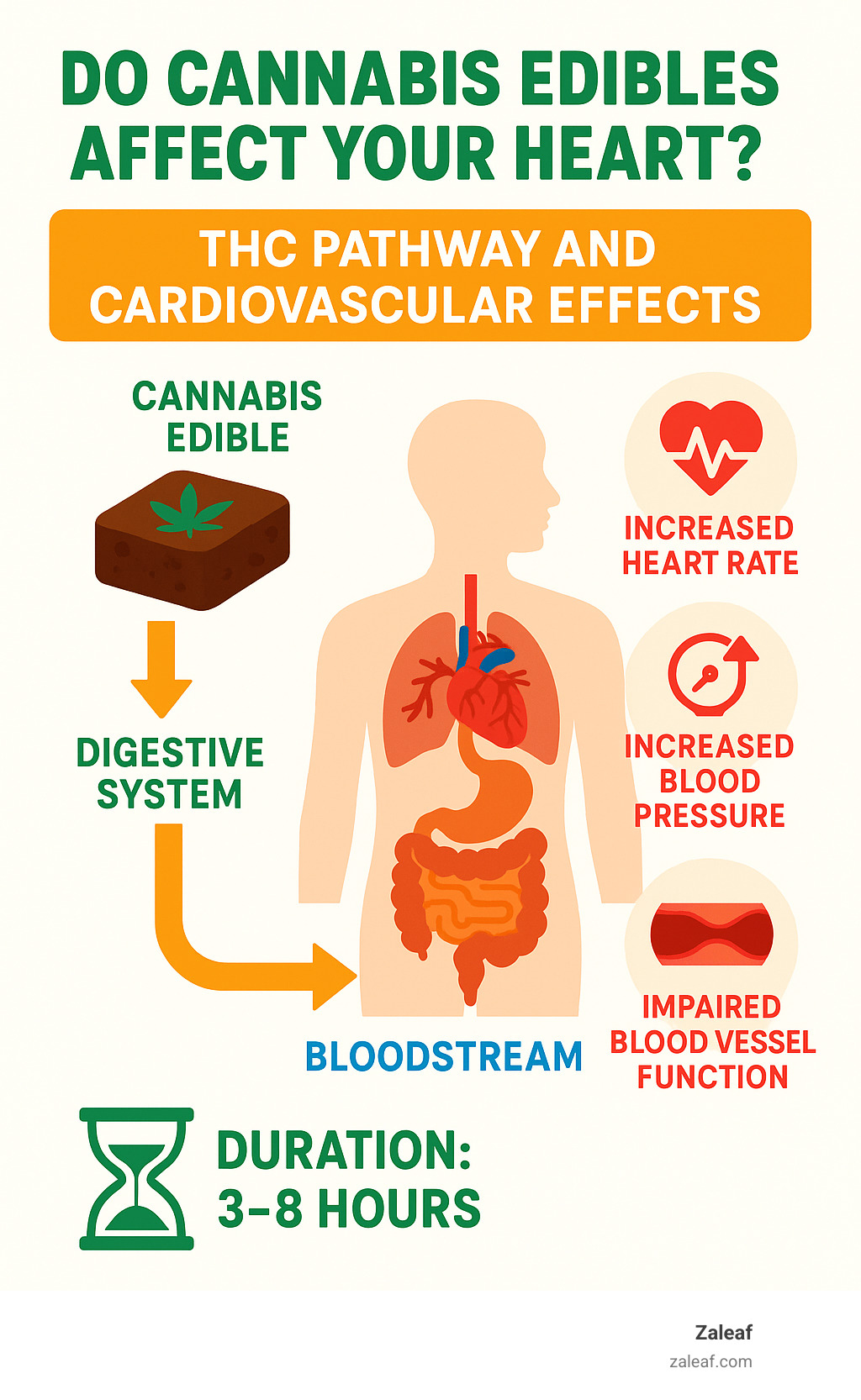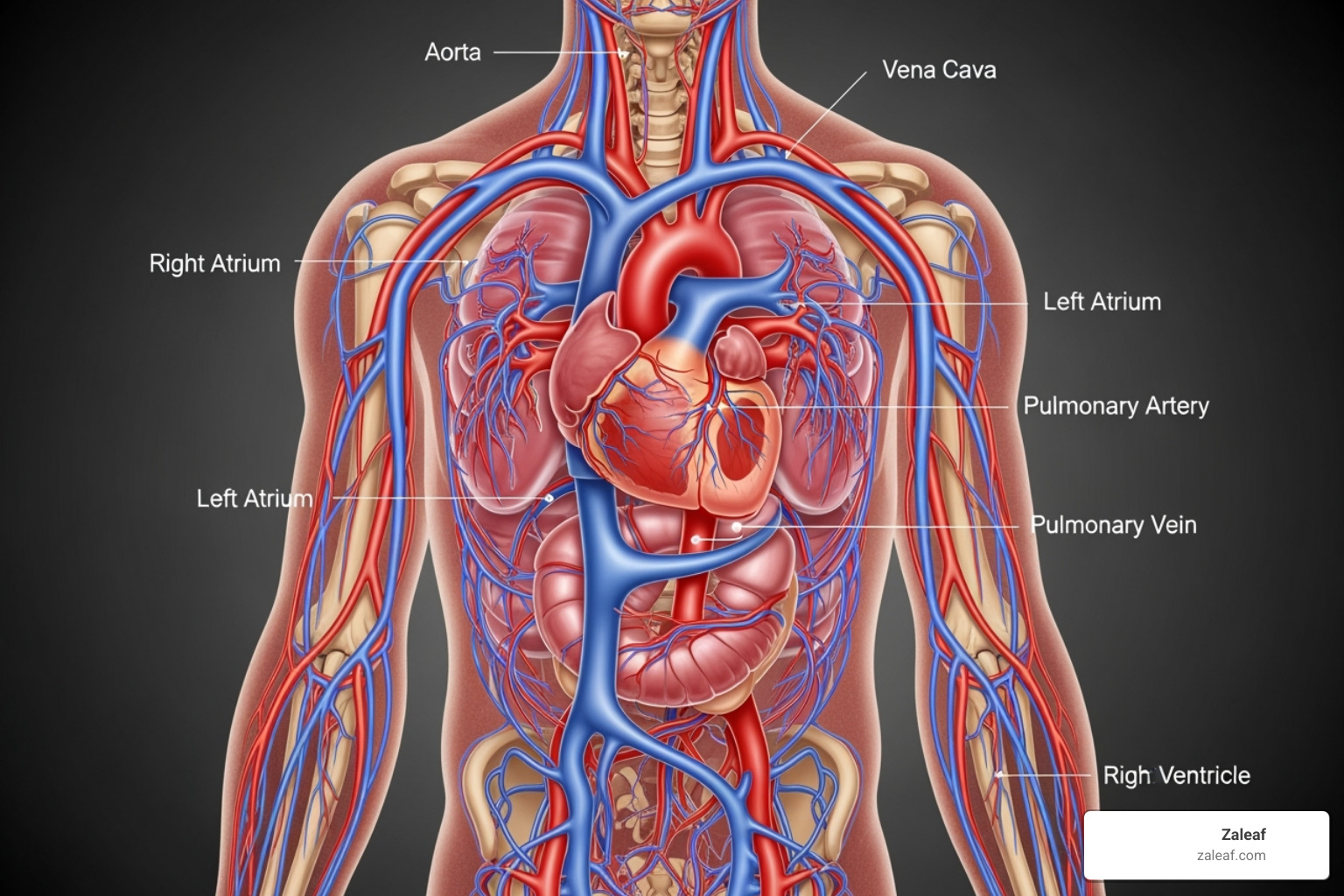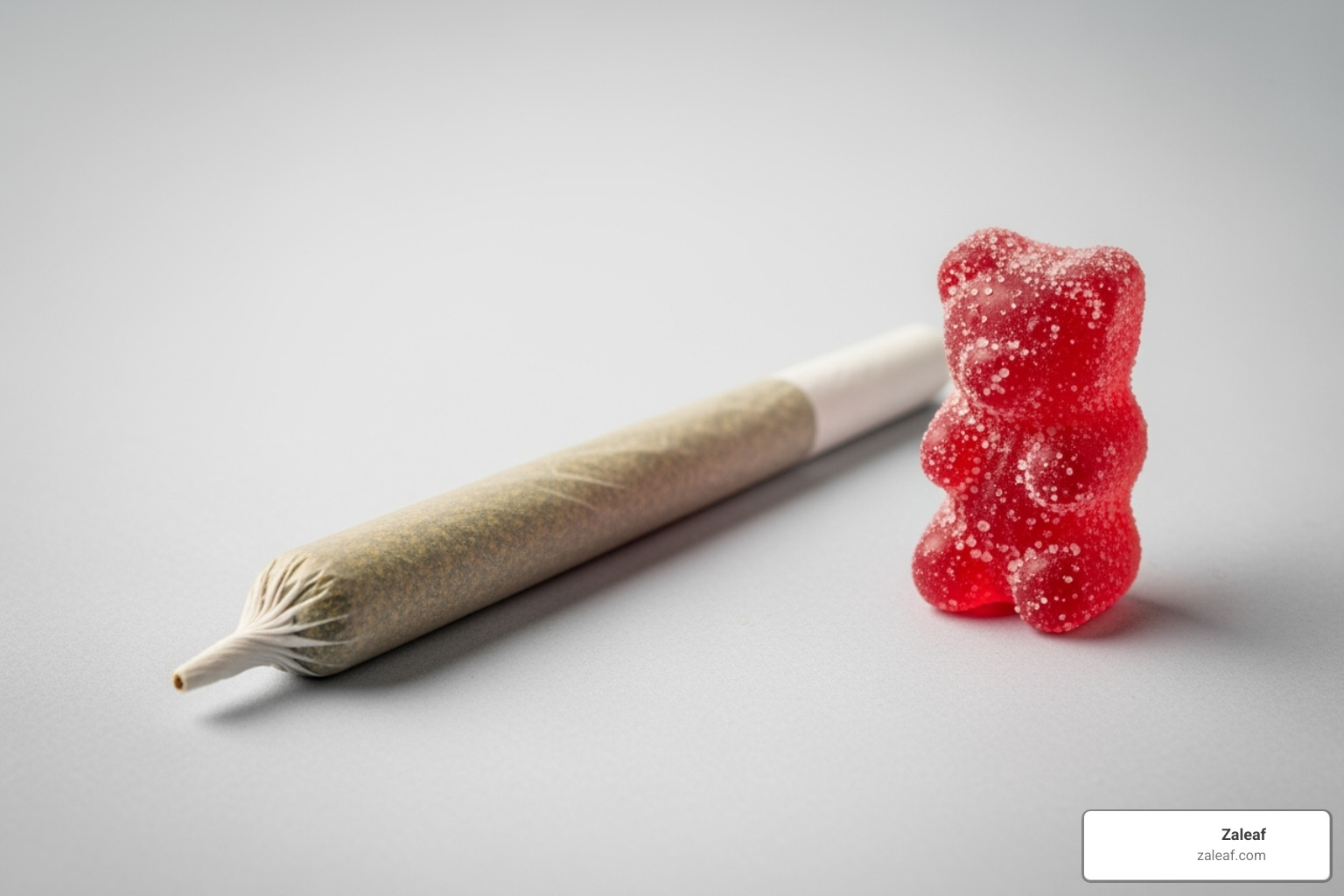Pumping Up or Pumping Down? The Truth About Edibles and Your Heart

The Growing Questions About Cannabis Edibles and Heart Health
Do cannabis edibles affect your heart? The short answer is yes - recent research suggests cannabis edibles can significantly impact cardiovascular health, potentially reducing blood vessel function by up to 56% compared to non-users.
Quick Facts About Edibles and Your Heart:
- Heart Attack Risk: Daily cannabis users have 25% higher odds of heart attack
- Stroke Risk: Daily users face 42% higher odds of stroke
- Blood Vessel Function: Edible users showed 56% reduced vascular function vs. non-users
- Duration: Effects last 3-8 hours, longer than smoking
- Emergency Visits: Edibles account for 11% of cannabis-related ER visits despite only 0.32% of sales
As cannabis legalization spreads across the country, more people are turning to edibles as a "safer" alternative to smoking. Many assume that avoiding smoke means avoiding health risks. But mounting evidence suggests this isn't the case.
The perception that edibles are harmless comes from their discrete nature and lack of lung irritation. However, THC itself - not just cannabis smoke - appears to pose cardiovascular risks. Whether you smoke, vape, or eat cannabis, your heart and blood vessels are affected.
Recent studies from major institutions like UC San Francisco reveal troubling findings. Cannabis users, whether they smoke or consume edibles, show blood vessel function comparable to tobacco smokers. Even more concerning, edible users in some studies showed greater impairment than smokers.
I'm Max Shemesh from Zaleaf, and through years of working in the cannabinoid industry, I've seen how important it is to understand questions like do cannabis edibles affect your heart before making consumption choices. My experience has shown me that education about both benefits and risks is crucial for anyone considering cannabis products.

Simple guide to do cannabis edibles affect your heart:
The General Cardiovascular Impact of Cannabis
Do cannabis edibles affect your heart? To understand this, we need to look at how cannabis works in your body. It's not just about feeling high - there's a whole system at play that directly connects to your heart health.
When you consume cannabis, whether through edibles or smoking, the main active ingredient THC travels through your bloodstream and interacts with something called the endocannabinoid system. Think of this as a vast network of tiny receivers throughout your body, including on your heart cells, fat cells, and platelets.
THC primarily activates what scientists call CB1 receptors. These receptors can influence your autonomic nervous system - the part of your body that controls things you don't think about, like your heartbeat and blood pressure. It's like THC is pressing buttons in a control room you didn't know existed.

Here's where things get concerning. Recent research shows that regular cannabis use is linked to some pretty serious heart problems. Daily cannabis users have 25% higher odds of having a heart attack compared to people who don't use cannabis. Even more alarming, their odds of having a stroke jump by 42%.
Within just one hour of consuming cannabis, THC can trigger your "fight or flight" response. Your heart starts racing (doctors call this tachycardia), and your heart muscle demands more oxygen. Sometimes, this can even cause dangerous heart rhythm problems.
The scientific research on cannabis and cardiovascular outcomes is painting a clearer picture each year, and it's not as reassuring as many people hope.
How THC Affects Your Blood Vessels
Your blood vessels are lined with special cells called endothelial cells. These tiny cells are incredibly important - they're like the managers of your circulatory system, controlling blood flow, keeping vessels healthy, and preventing dangerous plaque buildup.
Unfortunately, chronic cannabis use appears to damage these crucial cells significantly. Studies show that vascular function in chronic cannabis users can be reduced by roughly half compared to non-users. To put this in perspective, that's similar to the damage seen in tobacco smokers.
Here's a striking example: In one study, researchers measured how well blood vessels could dilate (expand). Non-cannabis users showed healthy vessel dilation of about 10.4%. Cannabis smokers dropped to 6.0%. But here's the surprising part - edible users showed even worse function at just 4.6%.
This impaired dilation means your blood vessels can't expand and contract properly. Blood flow becomes restricted, and plaque can build up more easily, potentially leading to heart attacks and strokes.
Researchers finded something interesting when they exposed healthy endothelial cells to blood samples from cannabis users. The blood actually hampered the cells' ability to produce nitric oxide - a crucial molecule that helps blood vessels relax and widen. This suggests that chronic cannabis use creates inflammation and oxidative stress that damages these vital cells.
The Role of Potency and Frequency
Cannabis isn't what it used to be. THC potency has been steadily climbing for nearly 50 years - increasing by about 0.29% every year from 1970 to 2017. Today's products pack a much stronger punch than what previous generations used, which could amplify heart-related risks.
Daily cannabis use is where the real danger lies. Studies consistently show that using cannabis every day, regardless of how you consume it, dramatically increases your risk of heart problems. Daily users face a one-third higher risk of coronary artery disease compared to non-users.
The effects are also dose-dependent. While small amounts might cause certain effects, higher doses can sometimes trigger opposite or more severe reactions, especially regarding heart rate and blood pressure. This is why starting with very low doses is so important, particularly with edibles where the delayed onset makes it easy to take too much.
If you're new to edibles, start with just 5-10 milligrams of THC. Even experienced adults often find 5 mg effective, with 10 mg producing quite strong effects.
Several key factors influence your cardiovascular risk when considering cannabis use: Age plays a crucial role, especially for adults over 65 who may have underlying heart conditions. Pre-existing conditions like coronary artery disease, high blood pressure, or diabetes significantly increase your vulnerability. Frequency of use matters enormously - daily use carries much higher risks than occasional use. THC potency directly correlates with stronger cardiovascular effects, while your individual metabolism can vary greatly from person to person. Finally, combining cannabis with alcohol, tobacco, or other substances can create additional strain on your cardiovascular system.
Understanding these factors is essential when asking do cannabis edibles affect your heart - because the answer depends heavily on your personal situation and usage patterns.
How Do Cannabis Edibles Affect Your Heart Compared to Smoking?
Many people assume edibles are automatically better for their heart than smoking cannabis. After all, no smoke means no lung damage, right? While that logic makes sense on the surface, the reality of do cannabis edibles affect your heart is much more complex than simply avoiding respiratory problems.

The key difference lies in how THC travels through your body. When you smoke cannabis, THC rushes directly into your bloodstream through your lungs. You feel the effects within minutes, but they typically fade after 1-3 hours.
Edibles take a completely different route. The THC must first journey through your digestive system, then get processed by your liver. During this liver processing, something interesting happens - the THC transforms into 11-hydroxy-THC, which is actually more potent than regular THC.
This change explains why edibles hit differently. The delayed onset means you might wait 30 minutes to 2 hours before feeling anything. Then, once the effects kick in, they can last 3-8 hours - much longer than smoking. This extended duration can become problematic if you've taken too much, since you're essentially along for the ride.
While edibles do avoid the lung irritation and harmful smoke particles that come with combustion, they introduce THC through entirely different pathways in your body. Unfortunately, as we're learning, avoiding smoke doesn't necessarily mean avoiding heart risks.
The Surprising Findings on Vascular Function
Recent research from UC San Francisco delivered some eye-opening results that challenge our assumptions about edibles being safer for the heart. The study measured how well blood vessels could dilate - a crucial indicator of cardiovascular health.
Here's what they found:
| Consumption Method | Average Vessel Dilation (vs. 10.4% in non-users) | Reduction in Vascular Function (vs. non-users) |
|---|---|---|
| Non-users | 10.4% | 0% |
| Cannabis Smokers | 6.0% | 42% |
| THC Edible Users | 4.6% | 56% |
The results were startling. Cannabis smokers showed a 42% reduction in blood vessel function compared to non-users. But edible users actually showed an even greater impairment - a 56% reduction. Both groups performed similarly to tobacco smokers, which puts the cardiovascular risks into perspective.
What makes this even more intriguing is that the mechanisms appear different. Cannabis smokers showed harmful changes in their blood that directly damaged endothelial cells in lab tests. When researchers exposed healthy blood vessel cells to blood samples from marijuana smokers, the cells' ability to produce nitric oxide dropped by 27% - similar to what happens with tobacco smoke.
But here's the puzzle: edible users didn't show these same blood changes, yet their blood vessels were still significantly impaired. This suggests that THC itself - not just the smoke - directly damages vascular function through pathways scientists are still working to understand.
The takeaway? Avoiding smoke is certainly beneficial for your lungs, but it doesn't eliminate the cardiovascular risks associated with THC consumption. For more details on these findings, check out this study on marijuana's effect on the heart.
What are the immediate effects of edibles on your heart?
Even though edibles take their time to kick in, once that THC hits your system, your heart definitely notices. The delayed onset can actually make these effects more dangerous because people often don't connect their symptoms to the edible they took hours earlier.
Heart rate increases are among the most common immediate effects. THC activates your sympathetic nervous system - your body's "fight or flight" response. This makes your heart work harder and beat faster, which can be particularly concerning if you already have heart issues.
Blood pressure changes are equally unpredictable. You might experience an initial spike in blood pressure, followed by a drop that makes you feel dizzy when standing up. These fluctuations put additional strain on your cardiovascular system.
The risk of overconsumption with edibles is real and dangerous. Because nothing happens for the first hour or two, many people assume they need more. By the time the original dose kicks in, they've already taken additional amounts. This can lead to an overwhelming experience with severe anxiety, paranoia, and panic attacks that can mimic heart attack symptoms.
Emergency room statistics tell a concerning story. In Colorado, edibles account for almost 11% of cannabis-related ER visits despite representing only 0.32% of total cannabis sales. Among those seeking emergency care for heart-related issues after using edibles, 8% required hospital admission - more than double the rate for those who smoked marijuana.
These numbers highlight why understanding do cannabis edibles affect your heart is so crucial for anyone considering these products. The combination of delayed onset, longer duration, and difficulty with accurate dosing creates a perfect storm for adverse cardiovascular events.
For safety guidelines on edible use, Colorado provides helpful resources at their edible safety page.
Key Risks and What Health Organizations Recommend
The conversation around do cannabis edibles affect your heart becomes even more serious when we look at what major health organizations are finding. The American Heart Association and other leading medical institutions aren't just raising eyebrows anymore—they're sounding real alarms about cannabis use and cardiovascular health.

The risks we're talking about aren't minor inconveniences. Heart attack risk jumps by 25% for daily cannabis users compared to people who don't use it at all. That's a significant increase that gets even scarier when you already have heart problems.
Stroke risk is even more concerning, with daily users facing 42% higher odds. Younger adults using cannabis show a 17% increased likelihood of ending up hospitalized for an acute ischemic stroke. These aren't numbers we can brush off.
Then there's heart failure, where some studies found a 34% increase in risk for daily marijuana users. Atrial fibrillation—that irregular heartbeat that can lead to strokes—also shows up more often in cannabis users. A Danish study linked medical marijuana use with a 64% increase in abnormal heart rhythms.
But here's something many people don't think about: interactions with heart medications. Cannabis can mess with how your body processes crucial heart drugs. Blood pressure medications, cholesterol-lowering statins, and heart rhythm drugs can all be affected. THC and CBD change how your liver processes these medicines, potentially making them less effective or causing dangerous side effects.
If you're taking blood thinners like warfarin, this gets especially tricky. Cannabis can change how these medications work, which means your doctor needs to monitor you much more closely and possibly adjust your doses.
What does research say about long-term use of edibles and how they affect your heart?
Here's where things get frustrating for anyone trying to make informed decisions. The research on long-term edible use is still playing catch-up with reality. For decades, cannabis was so restricted that scientists couldn't study it properly. Most existing heart studies focused on smoked cannabis, not edibles.
This creates a real challenge when trying to answer do cannabis edibles affect your heart over the long term. We're dealing with confusing factors too—many cannabis users also smoke tobacco, drink alcohol, or use other substances, making it hard to isolate what's causing what.
But here's what we do know: the evidence we have consistently points to increased cardiovascular risks with chronic cannabis use, regardless of how it's consumed. Dr. Robert Kloner, a respected cardiologist, acknowledges that while we need more research, the current data gives us serious reasons for concern.
The UCSF study showing that edible users had even worse blood vessel function than smokers is particularly eye-opening. It suggests that even without smoke, THC itself is doing real damage to our cardiovascular system.
The honest truth? We don't have decades of dedicated research on edibles yet, but everything we're learning suggests they're not the heart-safe alternative many people assume they are. The reduced blood vessel function, increased heart rate, and blood pressure changes we're seeing could lead to serious problems down the road.
Official Health Recommendations
The American Heart Association doesn't mince words when it comes to cannabis and heart health. Their position is crystal clear: people should avoid smoking or vaping any substance, including cannabis, because of potential harm to the heart, lungs, and blood vessels.
If you already have heart disease, the AHA's advice is even more direct—use cannabis with extreme caution, or better yet, avoid it completely. They emphasize that cannabis doesn't appear to offer any proven benefits for preventing or treating cardiovascular diseases.
For people who choose to use cannabis anyway, health organizations stress the importance of consulting with your doctor first. This becomes absolutely critical if you have risk factors for heart disease, take any medications (especially heart medications), or have existing health conditions.
Your healthcare provider can help you understand how cannabis might affect your specific situation. They can also help monitor for potential drug interactions and adjust treatments if needed.
The Lower-Risk Cannabis Use Guidelines that some organizations promote often focus on reducing frequency, choosing lower-potency products, and avoiding certain consumption methods. But the key message remains consistent: there's no completely safe way to use cannabis if you're concerned about your heart health.
For the complete picture of where medical experts stand, you can read the AHA's scientific statement on cannabis and cardiovascular health. It's sobering reading, but it's information everyone considering cannabis use should understand.
Frequently Asked Questions about Edibles and Heart Health
Let me address the most common questions I hear about edibles and heart health. These are real concerns that deserve honest, evidence-based answers.
Are edibles safer for your heart than smoking cannabis?
This is probably the question I get asked most often, and the answer might surprise you. While edibles definitely spare your lungs from the harmful effects of smoke, do cannabis edibles affect your heart in ways that are just as concerning as smoking? Unfortunately, yes.
Recent studies paint a clear picture: edibles still pose significant cardiovascular risks. That UCSF study I mentioned earlier found that edible users actually showed worse blood vessel function than smokers - a 56% reduction compared to 42% for smokers.
The key insight here is that THC itself appears to be the primary culprit, not just the smoke. Whether you're inhaling or eating cannabis, you're still getting THC into your bloodstream, and that's what's affecting your heart and blood vessels.
So while you're avoiding respiratory issues by choosing edibles, you're not necessarily protecting your heart. It's like choosing between two different routes to the same destination - both still get you there.
Can cannabis edibles cause a heart attack?
This question gets to the heart of why we're having this conversation. Cannabis use, including edibles, is linked to an increased risk of heart attack - especially if you already have heart problems.
The numbers are sobering: daily cannabis users have 25% higher odds of experiencing a heart attack compared to people who don't use cannabis. That's a significant increase that can't be ignored.
Now, does this mean eating a cannabis gummy will immediately cause a heart attack in a healthy person? Not necessarily. But edibles can trigger a chain of events that increases your risk. They raise your heart rate, affect your blood pressure, and over time, impair how well your blood vessels work.
For people with existing heart conditions, the risk is much higher. The combination of increased heart rate, blood pressure changes, and compromised blood vessel function creates a perfect storm for cardiovascular problems.
How long after taking an edible does it affect your heart rate?
The timing with edibles is tricky, and this delayed effect is part of what makes them potentially more dangerous than smoking. Unlike smoking, where you feel effects within minutes, edibles take their sweet time.
You'll typically start feeling cardiovascular effects 30 minutes to 2 hours after eating an edible. This happens because the THC has to travel through your digestive system and get processed by your liver first. It's like the difference between taking the express train versus the local - both get you there, but one takes much longer.
Once those effects kick in, they stick around for the long haul - often 3 to 8 hours. That means your heart rate could stay liftd and your blood vessels could remain impaired for most of your day.
This extended timeline is why so many people end up in emergency rooms after using edibles. They don't feel anything for an hour, think they need more, and then get hit with a double dose when everything kicks in at once. Your heart doesn't appreciate that surprise.
The delayed but prolonged nature of edible effects makes accurate dosing absolutely crucial. Start low, go slow, and give your body time to show you how it's going to react before taking more.
Conclusion: Making Informed Choices for Your Health
So, do cannabis edibles affect your heart? After diving deep into the research, the answer is clear: yes, they absolutely do. And perhaps not in the way you might expect.
The widespread belief that edibles are the "heart-safe" option compared to smoking doesn't hold water when we look at the science. While you're definitely sparing your lungs from harmful smoke, your cardiovascular system is still very much in the game. THC itself - whether it arrives via your lungs or your digestive system - has real effects on your heart and blood vessels.
The numbers we've explored are pretty eye-opening. Edible users showed 56% reduced vascular function compared to non-users - that's actually worse than what researchers found in cannabis smokers. Your blood vessels become less flexible, less able to expand and contract properly. It's like the difference between a new garden hose and one that's been left out in the sun for years.
The immediate effects aren't trivial either. That increased heart rate and blood pressure fluctuation can last for hours with edibles - much longer than with smoking. And because edibles take so long to kick in, it's easy to accidentally take too much, which can send you straight to the emergency room with heart palpitations and panic.
What's particularly concerning is how daily cannabis use - regardless of whether you smoke or eat it - raises your odds of serious problems. We're talking about a 25% higher risk of heart attack and a 42% higher risk of stroke. These aren't small numbers, especially if you already have heart issues or other risk factors.
The research on long-term edible use specifically is still catching up, which is frustrating but understandable given how recently these products became widely available. What we do know from the broader cannabis research doesn't paint a reassuring picture for frequent users.
Major health organizations like the American Heart Association aren't mincing words here. They're recommending that people with heart disease avoid cannabis entirely, and they're emphasizing that there's no proven cardiovascular benefit to offset these risks.
If you're going to use cannabis despite these risks, moderation and caution really are your best friends. Start low, go slow, and be honest with your doctor about your use - especially if you're taking heart medications or have any cardiovascular concerns.
For those who choose to move forward with cannabis use, working with third-party tested products from a trusted source like Zaleaf ensures you know exactly what you're getting. Our commitment to precise cannabinoid and terpene profiles means you can better control your experience, and our rigorous testing helps eliminate the guesswork around potency and purity. We believe in making 100% legal cannabis products accessible with fast shipping and discrete packaging, without requiring an ID or medical card - because informed choices should be available to everyone.
The bottom line? Edibles aren't risk-free for your heart. Both the smoke from cannabis and THC itself pose real cardiovascular risks. More research is definitely needed, but the evidence we have now suggests caution is warranted, especially for frequent users.
Your heart health matters. Make sure you're weighing these risks carefully before deciding what's right for you.
For more comprehensive information about edible cannabis and making informed choices, visit our dedicated section on edible cannabis.

